- Home
- Jennifer Donnelly
A Northern Light Page 19
A Northern Light Read online
Page 19
The woman wrinkled her nose. "Those are faux Indians. I want the real thing. The noble savage in the wilderness. Primitive man in all his glory."
"I'm sorry, ma'am, I don't know...," I started to say, miserably awkward.
Weaver was suddenly at the table refilling the water glasses. I had no idea how he got there, and I wished he hadn't. He had that look in his eyes. The one I knew too well.
"You want to see Mose LaVoie, ma'am," he said. "He's a full-blooded Saint Regis. Lives up past Big Moose Station. In a tepee in the woods."
My mouth dropped open.
"There you go, Maudsy!" the gentleman said.
"How exciting!" the woman said. "How will we know him?"
"He's hard to miss, ma'am. He wears buckskins. Though that's only when it's cold. This time of year, he just wears a loincloth. And a bear-claw necklace. And fearhers in his hair. Just go up to the Summit Hotel and ask for Injun Mose."
I nearly choked. Mose LaVoie was an Indian, but he certainly did not live in a tepee. He lived in a log house and he wore a shirt, trousers, and suspenders like every other man. He was nice enough if he knew you, but he had a temper and it came out when he drank. He'd take a swing at a locomotive if he thought it was looking at him the wrong way. He'd put out the windows in the Summit on more than one occasion, and he was certain to knock the head off any fool tourist who called him Injun Mose instead of Mr. LaVoie.
"A genuine redskin! Imagine that! He'll be the perfect guide to the real Ho De Ron Dah!"
Weaver grinned from ear to ear. "Yes, ma'am, he sure will," he said.
I caught up with him at the coffee station. "You're going to have four murders on your conscience, Weaver Smith. I hope you're all right with that."
"They shouldn't laugh at you," he said. "And they shouldn't call me colored."
"Oh, Weaver, they didn't." He hates being called that word, colored. He says he is a person, not an Easter egg.
"They did. Last night when they arrived and again at breakfast. Ever seen Mose LaVoie when he's mad?"
"Only from a distance."
"Me, too. And I reckon this ought to make us just about even."
Table seven was bad, but table six was the worst of all. The very worst. It was a single man. A Mr. Maxwell. He was small and slight. Balding. And sweating, too, even though it wasn't terribly warm. One must always steer clear of men who sweat when it isn't warm. He held the menu on the table and bent his head toward it, squinting and mopping his brow with his handkerchief as he studied it.
"I'm afraid I've left my glasses in my room," he finally said. "Would you mind reading the entrees for me?" I thought his eyes must be very bad indeed, because he looked at my bosom as he spoke, not my face.
"I'd be happy to," I said, just as green as a frog. I leaned over him and started reciting. "Baked ham, broiled spring chicken, boiled tongue..."
Just as I got to the veal in aspic, he pulled his napkin off his lap. Under it was something that looked rather like a frankfurter. Only no frankfurter I'd ever seen stood at attention.
"I'll have the veal in aspic," he said, covering himself again.
My face was flaming as I went back into the kitchen. It was so red that Cook noticed it immediately. "What have you done?" she barked. "Did you drop something?"
"No ma'am, I ... I just stumbled, that's all," I lied. I couldn't bear to say what really happened. Not to anyone.
Fran, picking up an order, heard us. She came up to me. "Table six?" she whispered.
I nodded, looking at the floor.
"The dirty dog! He did it to me yesterday. You should drop something, all right. A jug of ice water. Right in his lap! Don't go back there, Matt. I'll get Weaver to take the table."
"Fran! Where are you?" Cook bellowed. "Pick up, pick—"
She didn't get to finish her sentence, because just then, the kitchen fell under attack.
There was an explosion. Louder than the Old Forge town cannon on the Fourth of July. Worse than anything I'd ever heard. Ada screamed. I did, too. "Oh, mein Gott!" Henry yelled. Shrapnel went whizzing through the air and hit one of the gas lamps. Glass came raining down. Ada and I ducked behind the cold station, clutching each other. There was another explosion, and another. There was more screaming and more glass. I chanced a look up; the ceiling was dented in half a dozen places. More lamps had been smashed. A window was broken.
I felt a wetness on my face. It was hot. "Ada!" I said frantically. "Ada, I think I'm bleeding." Ada raised her head and looked at me. She touched my cheek. I looked at her fingers, expecting to see crimson, but instead I saw white. Ada sniffed it. "Smells like milk," she said. We stood up cautiously, still holding on to each other.
Fran and Weaver were peering out from behind the icebox. Bill was crouched under the sink. Two more waitresses and another busboy had hidden in the cellar way. I saw the door open a crack and their eyes blinking from the gloom. The kitchen was a complete disaster. The mess was breathtaking. The same sticky goo that was on my face was dripping from the ceiling. There was glass on every surface—on the plates, in the cutlery trays, on the serving platters, all over the floor. A cake batter, three pies, a bowl of biscuit dough, a pan of gelatin, a pot of soup, four trays of cookies, and a crab mousse were ruined.
I heard a moan coming from under the big plank worktable in front of the stove. It was Cook. She was lying facedown on the floor. Ada and I ran to help her up. She looked all around, shaking her head at the devastation.
"Where's Henry?" she gasped. "Where the devil is he?"
Henry came out from the pantry. He was ashen and trembling.
"You put those cans right on the stove, didn't you?" she yelled at him.
"You ... you try to kill me!" Henry shouted at her. "You tell me heat milk, then Blam! Blam! Blam!"
"In a pot, you jackass! In a pot! You can't heat cans; they explode. Don't you know that? What kind of godforsaken ass-backward caveman country do you come from?" she roared.
"You try to kill me," Henry insisted. Obstreperously.
"Not hard enough," Cook said. She picked up a carving knife. Henry bolted out through the screen door. She was right on his heels.
Half an hour later, she was back at her stove, wiping it clean, and Henry was nowhere to be seen. The rest of us were busy washing and mopping. I was at the sink, rinsing out my rag, convinced I'd come to work at a lunatic asylum. Only here, the lunatics were allowed to roam free, blowing things up or threatening to kill one another. I remembered what Pa had told me: He'd come after me, or get Royal to, if I wanted to go home. I remembered what he'd said about low-down jacks taking rooms in fancy hotels, too, and wished I could tell him what table six had done. Pa would settle that man's hash for him, but then I'd be on my way home whether I wanted to go or not, hearing "I told you so" the whole way. And then Weaver came up to me and pressed something crinkly into my hand. A whole dollar bill.
"What's this?" I asked him.
"Your tip. From table six."
I shook my head. "I don't want it," I said, trying to hand it back. "Not from him."
"Don't be stupid. It's the easiest money you'll make all summer. Hell, the old duffer can flash me for a dollar."
Fran appeared with a bucket of dirty water. "I'd give it another look for a quarter," she said, giggling.
Both Fran and Weaver jollied me until we were all three laughing, until I took the dollar and put it in my pocket along with the dimes and nickels I'd collected from my other tables, until Cook—seeing us idle—picked up her knife, pointed it at us, and said, "Stop loafing and start working before I tell Mr. Morrison to dig three more graves right next to the one he's digging for Henry."
So we did.
li • mic • o • lous
Everyone in Big Moose and Eagle Bay and Inlet and the whole North Woods knew that it was bad luck to sharpen a tool after dusk. Everyone, it seemed, but Henry.
It was evening, about eight or so, and Cook had sent me down to the boathouse, where the guides were
giving a fly-casting demonstration, with a tray of sugar cookies and a pitcher of lemonade. When I came back, there was Henry—sitting on the kitchen steps, sharpening a filleting knife. Cook had got it out of him that his so-called apprenticeship in the finest kitchens of Europe had consisted of mopping floors and emptying garbage pails. He was in disgrace and had to do all the menial jobs, like cleaning fish, and making stock from bones and peelings, and sharpening knives. She would have liked to send him packing, but she couldn't. The season was under way and help—good or bad—was hard to find.
"Henry, don't do that!" I scolded. "It's bad luck!"
I could do that now—scold Henry and tease Bill and joke with Charlie, the bartender, and the guides—for I'd been at the Glenmore a whole week and had received my first wages, and I belonged now, too. Just as much as they did.
"Vat luck? No luck but luck vat you make," Henry said stubbornly, keeping on with his task.
Well, he made some luck all right. Bad luck. And not for himself, either.
I thought of that knife, and of the sharpening stone, the second I saw Weaver's face. It was maybe half an hour later and Cook and I were hanging out dishrags on a line near the back steps when John Denio brought him to the kitchen door. We gasped at the sight of him, then hustled him inside as fast as we could, hoping the Morrisons and Mr. Sperry wouldn't find out. But they did.
"Weaver, why can't you ever stay out of trouble?" Mr. Sperry shouted, storming in from the dining room. "I send you to Big Moose Station on a simple errand—to help John pick up new arrivals—and look what happens. One of the guests said there was a fight. Were you in it?"
Weaver lifted his chin. "Yes, sir, I was."
"Damn it, Weaver, you know my policy on fighting..."
"It wasn't his fault, Mr. Sperry," I quickly said, dabbing witch hazel on the cut below Weaver's eye. "He didn't start it."
"But he could have stopped it," Cook said, wiping blood from Weaver's nose. "Could have stepped aside and let the trash blow down the sidewalk, but no, he has to run his mouth."
"What happened?" Mr. Sperry asked.
John Denio answered. All three of us—Cook, Mr. Denio, and myself—knew better than to let Weaver do the talking.
"He was attacked," John said. "In front of the station. The train was late. I went to talk to the stationmaster and left Weaver in the wagon. Three men came out of the Summit Hotel. Trappers. They were drunk. They said some things. Weaver answered back. One of them hauled him out of the seat and all three of them beat him. I heard the noise, ran out, and broke it up."
"Three to one, Weaver? For Gods sake, why didn't you just keep quiet?"
"They called me nigger."
Mr. Sperry took Weaver's chin in his hand and grimaced at the damage. A cut eye that was already blackening. A nose that might well be broken. A lip as fat and shiny as a garden slug. "It's just a word, son. I've been called worse," he said.
"Beg your pardon, Mr. Sperry, but you haven't," Weaver said. "I'm going to the justice of the peace tomorrow," he added. "I'm telling him what happened. I'm pressing charges."
Mr. Sperry sighed. "You're just bent on kicking skunks, aren't you? From tomorrow on, you're to stay in the kitchen. You can wash dishes and mop floors and do whatever else Cook can find for you until your face heals."
"But why, Mr. Sperry?" Weaver asked, upset. He wouldn't earn tips working in the kitchen.
"Because you look like you fell into a meat grinder! I can't have you serving guests with a face like that."
"But it's not right, sir. I shouldn't be called names. Shouldn't catch a beating. Shouldn't have to stay in the kitchen, either."
"How old are you, Weaver? Seventeen or seven? Don't you know that what should be and what is are two different things? You should be dead. Luckily, you aren't. You think on that the next time you decide to take on three grown men." He stormed back out. Cook went after him to ask about a delivery, John returned to his horses, and the two of us were left alone.
Limicolous, my word of the day, means something that lives in the mud. I thought it was a very good word to describe the men who beat Weaver, and told him so. Weaver had other words to describe them, though, and it was a good thing Cook didn't hear them.
"Hush, Weaver, just let it go," I said, wrapping up a chunk of ice in a towel. "A few days in the kitchen won't kill you. It's better than losing your job. Here, hold this against your lip."
"Don't have much of a choice, do I?" he grumbled. He pressed the ice to his lip, winced, then said, "Three more months, Matt. Just three more months and I'm gone from here. Once I get through Columbia, once I'm a lawyer, ain't no one ever going to hand me a suitcase. Or call me boy or nigger or Sam. Or hit me. And if they do, I'll make sure they go to jail."
"I know you will," I said.
"I'll find myself a new place. A better place than this one, that's for sure. We both will, won't we, Matt?" he said, his eyes searching mine.
"Yes, we will," I said, busying myself with the witch hazel, for I could not meet his gaze.
I'd already found myself a new place, one I'd never intended to find, but I was in it now all the same. It was a place for myself alone and one I couldn't tell Weaver about, no more than I could tell Miss Wilcox. It was in Royal Loomis's arms, this place, and I liked it there. Weaver would never understand that. Sometimes I barely did myself.
I hear a loon calling from the lake. The tourists all say its a beautiful sound. I think its the loneliest sound I know. I am still reading. Still looking for a different answer. Another outcome. A happier ending. But I already know I'm not going to find it.
South Otselic
June 28, '06
My Dear Chester,
...I think I shall die of joy when I see you, dear. I will tell you lam going to try and do a whole lot better, dear, I will try not to worry so much and I won't believe horrid things the girls write. I presume they do stretch things, dear. I am about crazy or I could reason better than I do. I am awfully pleased you had such a jolly time at the Lake, dear, and I wish I had been there, too. lam very fond of water, although I can't swim. I am crying and can't half write. Guess its because my sister is playing her mandolin and singing "Loves Young Dream. "lama little blue...
It is a long letter and there are many more lines to read, but my eyes keep straying back to one line: I am very fond of water, although I can't swim. A chill grips me. I throw it off and keep reading.
...Chester, my silk dress is the prettiest dress I ever had, or at least that is what everyone says. Mamma don't think I have taken much interest in it. I am frightened every time it is fitted. Mamma says she don't see why I should cry every time they look at me ... Chester dear, I hope you will have an awfully nice time the 4th. Really, dear, I don't care where you go or who you go with if you only come for the 7th. You are so fond of boating and the water why don't you go on a trip that will take you to some lake?...
I can't read any more. I try to stuff the letter back into its envelope, but my hands are shaking so hard, it takes me three tries.
He knew she couldn't swim. He knew it.
I begin to weep then. I hold my hands over my face so that no noise gets out, and cry as though my heart is breaking. I think it is.
There are a few more letters, but I can't read them. I should never have read the first one, never mind nearly all of them. I stare into the darkness and I can see Grace's face as she handed me the letters. I hear her saying, "Burn them. Please. Promise me you will. No one can ever see them."
I burrow down into my pillow and close my eyes. I feel so old and so tired. I desperately want to sleep. But the darkness swirls behind my eyelids, and all I can think about is the black water of the lake closing around me, filling my eyes and ears and mouth, pulling me down as I struggle against it.
I am very fond of water, although I can't swim...
grav • id
The last time I saw her, Miss Wilcox said that "A Country Burial" by Emily Dickinson was perfection in eight lines.
Ample make this bed.
Make this bed with awe;
In it wait till judgment break
Excellent and fair.
Be its mattress straight,
Be its pillow round;
Let no sunrise yellow noise
Interrupt this ground.
These lines astounded me. They were as beautiful, as pure, as a prayer. I repeated the poem silently to myself as Royal told me about the new hybrid corn they had at Beckers Farm and Feed.
It was a Wednesday afternoon, and I had a half day off from the Glenmore. Royal was driving me to Minnie's house on his way into Inlet. He'd come to fetch me at the hotel and Fran and Ada giggled and Weaver rolled his eyes and Cook smiled, but I ignored them all.
Royal talked a mile a minute as we rode. I nodded and did my best to listen, but I was thinking how much better Ample make this bed is than Make this bed amply, which is what I would have written. And I was thinking that Emily Dickinson was a dreadful woman. She flitted and hid prettily amongst her words like a butterfly in a garden. She lulled you into thinking she was only talking about a burial, or a bed, or roses, or sewing. She got your trust. Then she sneaked up behind you and whacked you over the head with a plank. In "Charlotte Bronte's Grave." In "The Chariot." In "The Wife." And "Apocalypse."
"...and Tom L'Esperance says the new seed gives ears that are twice as big as the seed we've been using and that..."
Even after having had the book in my possession for several weeks, I would start a poem feeling that I was up to the task—girded—and then, before I even knew it, I was wiping tears off the pages lest the water pucker them. Sometimes I took her meaning in my head, and that was bad enough. Other times she was more veiled and I could only understand it with my heart, and that was even worse. She provoked so much feeling with her small, careful words. She did so much with so little. Like Emmie Hubbard, with the paints she made from berries and roots. And Minnie making filling dinners for Jim and the hired hands out of nothing. And Weaver's mamma getting Weaver all the way from Eagle Bay to the Columbia University with her wash pot and chickens.

 Rogue Wave
Rogue Wave Waterfire Saga, Book One: Deep Blue (A Waterfire Saga Novel)
Waterfire Saga, Book One: Deep Blue (A Waterfire Saga Novel)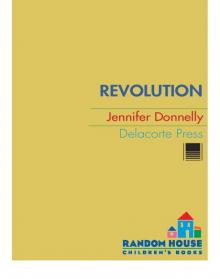 Revolution
Revolution The Wild Rose
The Wild Rose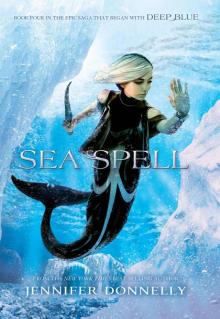 Waterfire Saga (4 Book Series)
Waterfire Saga (4 Book Series)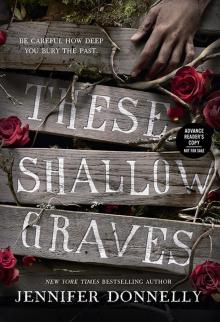 These Shallow Graves
These Shallow Graves Beauty and the Beast: Lost in a Book
Beauty and the Beast: Lost in a Book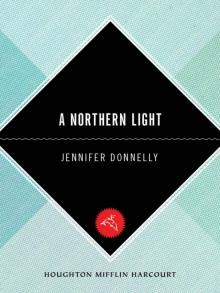 A Northern Light
A Northern Light The Tea Rose
The Tea Rose Waterfire Saga, Book Three: Dark Tide: A Deep Blue Novel
Waterfire Saga, Book Three: Dark Tide: A Deep Blue Novel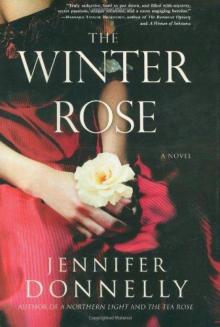 The Winter Rose
The Winter Rose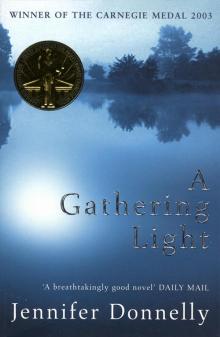 A Gathering Light
A Gathering Light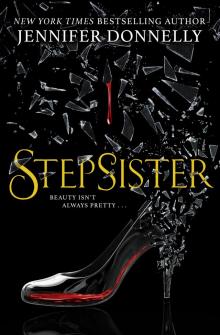 Stepsister
Stepsister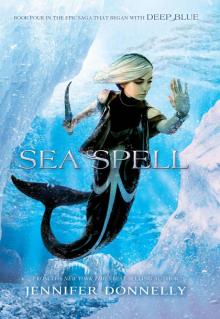 Waterfire Saga, Book Four: Sea Spell: Deep Blue Novel, A
Waterfire Saga, Book Four: Sea Spell: Deep Blue Novel, A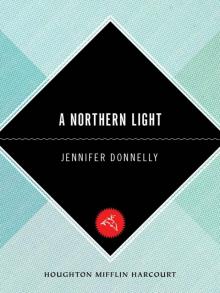 Northern Light
Northern Light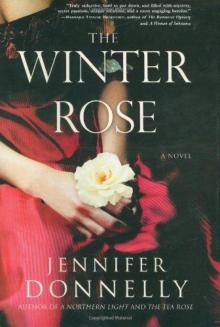 Winter Rose, The
Winter Rose, The